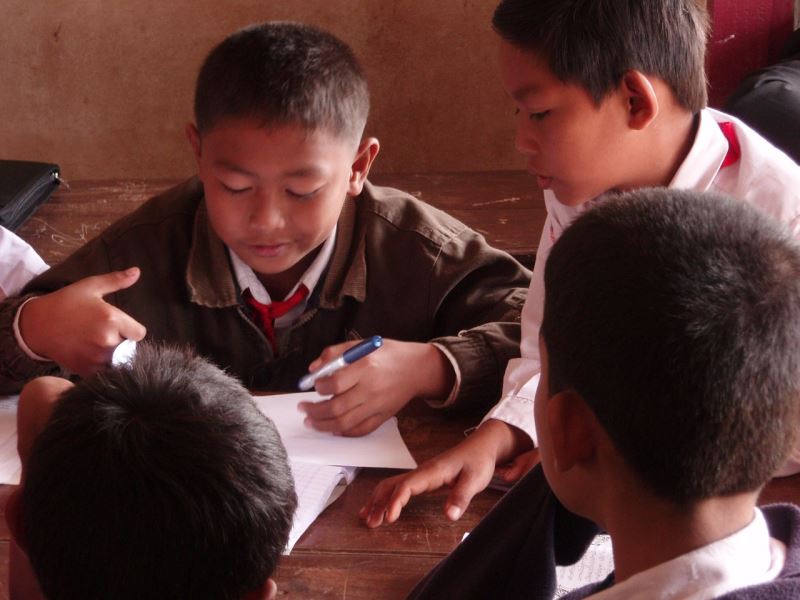A child is like a seed the parent and the teacher nourish together to transform into a beautiful tree. Without the meaningful engagement of these two agents the holistic growth of a child is impossible. Over the years, the relationship between the child, the parent and the teacher has undergone many changes- amidst this transformation what is the importance of this sacred bond?
By Manaswini Sridhar is a language trainer and a freelance ELT editor.
We are a country that is credited for the Gurukulam system and we continue to hold it in great reverence. In this system parents raised their children to a certain age and then entrusted them to the Guru with the strong conviction that the Guru (and in all probability his wife) would impart the highest kind of knowledge to the child and make sure that the child became not only an asset to the family, but also to the society. The parents also believed that the Guru’s wife would treat their ward like her own, feed the child and instill the ‘right’ belief systems in the child. Parents did not have the facility (or even the permission in certain cases) to visit their children.. Most of them saw their children after long intervals. No matter what anguish the parents or the child suffered because of the separation, there was an unshakeable faith that they (guru and guardian) were doing the best for the child, and for the society. It is probably this implicit faith in the Guru that was in many ways responsible for the Guru giving his very best to his pupils.
This is precisely the ‘golden triangle’ that is being extolled today, and that schools are striving towards…the triangle of the parent, the child and the teacher. But how successful is today’s generation in forming this triangle and making sure that it is equilateral and not a scalene triangle? In order to foster this harmonic triangle, it is vital that all three parties are recognized as important players, and that power does not slide into the hands of just the teacher or the parent, who may then use the student/child as a pawn in the power struggle. What is even more important is to understand that the child is of utmost importance and so the focus must be upon her. ,
A popular saying goes, “Money isn’t everything”. Thus while parents pay fees for teachers’ salaries, the work of the teacher cannot be seen as just another commodity. After all the teacher translates that money into knowledge that will help the child have a better future and have a better perspective of the world. It can be said that this knowledge can be imparted to the child even by the parent (as homeschooling is proving to do today), but how many parents have the luxury or the aptitude to play the role of the academic teacher in addition to the role of the wage earner, father/mother and guardian? If parents understand that it takes all kinds to make the world, they would probably comprehend that many teachers take up the profession not because, “Those who can, do; and those who cannot, teach,” but because they have a strong desire and passion to be with children who are not necessarily their own, and nurture them. Parents should remember this before they parade the somewhat vulgar attitude of ‘you are here because we are paying the school fees.’ A good parent will not hint this even the slightest to his or her ward. A student needs to respect his teacher, and the teacher’s profession in order to pay attention and heed to his teacher, his mentor. It is this heeding that will empower the student to equip himself/herself with all the skills that are necessary to make a successful life, and the society a better place to live in.
Similarly, the teacher too must, without paying much notice to the outer strappings of the parent, understand that the adult is genuinely interested in his or her ward, and wishes the best interests of the child and the teacher herself shall encourage the parent to shoulder some of the school responsibility as the parent spends more time with the child than does the teacher! If there is a discipline issue, the teacher needs to confide in the parent; maybe the parent is facing the same issue at home and thinks that the teacher does not face such issues with the child. Conversely, maybe the child is quiet at home but is otherwise at school. The parents and the teacher need to work together to make the child not just academically qualified, but a complete, well balanced person.
It is heartening to see parents who are supportive of their children in the presence of the teacher; however, the parent mustn’t overdo it by being unrealistic. If there is an issue with the child, the parent has to be candid about it and work it out with the teacher. By this, I don’t mean that we strip the child stark naked (figuratively) like some parents unfortunately do. How many times have we heard a parent telling the teacher, “Yes, you are right; she just doesn’t listen. She is impossible!”? Does the parent think that by echoing the teacher’s estimation of the child, the parent will not be expected to shoulder the burden of disciplining the child? The golden rule is that just as the parent should not seek to be the ‘child’s friend’, the parent should also not endeavor to be the ‘teacher’s friend’.
The most beneficial manner in which the parent can contribute to the child’s success is in telling the child that he/she has a good teacher and that the job of a teacher is demanding. Joining in with the child in berating the teacher may do the parent’s ego a lot of good, but serves no other purpose; as a matter of fact, it proves detrimental because the teacher may turn out to be the better guide and mentor for the child since he/she is a trained professional. Encouraging children to wish their teacher on teacher’s day is a simple reminder both for the teacher and the child that by working together, they are assisting one another in attaining their goals.
Parents are upset if teachers pass comments about their wards in the presence of others. However, the favorite pastime of most parents seems to be to gossip about the not-so-favorite teacher/s of their own ward. If the parent does not respect the teacher or does not advise the ward to respect the teacher, then of course the teacher has to deal with a challenging parent and an ill behaved student; but what the parent should understand is that this unpleasant situation is short-lived and lasts only for one academic year for the teacher, and if the teacher is mentally strong, he/she will just brush the situation aside. The child, however, who basks in the false belief that he/she is not able to perform in a subject because the teacher is ill equipped to handle the subject or because he/she is the target of the teacher’s abuse, forever loses interest in that particular subject, thereby limiting his or her career options. Thus this is a damaging practice to both the child and the parent.
For those parents who truly believe that their ward has grave problems with the teacher, the best thing to do would be to have a three-way face-to face communication and thrash out the so-called problems, provided the teacher and the parent are both mature enough to handle the situation. On these occasions, the teacher herself may sometimes understand that perhaps she does come across as being harsh with the child because she knows the child is capable of much more but is not putting in his/her best because of the ‘gang’ the child fits in with. The parent may too understand that he/she has not seen the overall picture and has accepted the child’s version only because it has been a constant refrain at home. The child too perceives that the teacher has been pushy not because she has been partial towards the other students, but because the teacher has actually been partial towards him/her, in the hope of bringing out the student’s potential. Teachers with many years of experience often tell the concerned parent, “You may want to believe that everything you hear about school is true; remember, we too may want to believe all that happens at home is true.” Quite the shocking revelation, isn’t it? Doesn’t this imply that if the teacher and the parent don’t join hands, they are playing right into the hands of someone much younger than them?
Teachers are forever striving to encourage their primary students by giving them stars or smiley faces in their notebooks; as middle school students, the encouragement is given in the form of more responsibilities, positive comments and pep talk. Parents and students guzzle these words of encouragement hungrily and readily; the parent is aglow because the child has won the teacher’s approval. Yet, how many parents know when Teacher’s Day is celebrated? If they are aware of the date, how many care to mark it in their calendar or the calendars of their children so that the child wishes the teacher/teachers on that day and offers a token of appreciation in the form of a handmade card in which the child thanks the teacher for just being there? Wouldn’t it also make sense for the parents to sign the card, to thank the teacher for helping the child make academic stridesyear after year? This simple yet meaningful gesture of appreciation does not take much time, does it?
A great teacher not only has core competence but also has excellent interpersonal and communication skills in order to gently nudge the parent and the ward from his comfortable cocoon and expose them to the wide world outside. The teacher does this with the parent by helping the parent understand how to help the child with homework or tests, or by sharing articles and website links that talk about a similar problem that the child might have. Ultimately, if the parent understands that the teacher cares genuinely about the child, the battle is already half won. Again, by asking the parent to help out on a field trip (and not necessarily the field trip that the ward may be going to), or talking about their careers in the future or just by helping out with the decoration during Christmas and Diwali, parents feel more involved in the school and hence make sure that they follow the routine of the school more religiously because working at close quarters with the school helps them understand that without the support of the individual parents, it would be almost impossible for the school to motivate and work with their students.
The beautiful poem below sums up the relationship between the teacher, the parent and the child. It’s worth sharing with everyone because this is what true education is about.
Whose Child Is This?
“Whose child is this?” I asked one day
Seeing a little one out at play.
“Mine,” said the parent with a tender smile
“Mine to keep a little while.
To bathe his/her hands and comb his/her hair,
To tell him/her what he/she is to wear,
To prepare him/her that he/she may always be good,
And each day do the things he/she should”.
“Whose child is this?” I asked again,
As the door opened and someone came in.
“Mine,” said the teacher with the same tender smile.
“Mine, to keep just for a little while.
To teach him/her how to be gentle and kind,
To train and direct his/her dear little mind,
To help him/her live by every rule,
And get the best he/she can from school”.
“Whose child is this?” I asked once more,
Just as the little one entered the door.
“Ours,” said the parent and the teacher as they smiled.
And each took the hand of the little child.
“Ours to love and train together.
Ours this blessed task forever.”
-Poet Unknown
This article is published in The New Leam, May Issue( Vol.2 No.12) and available in print version. To buy contact us or write at thenewleam@gmail.com
Or visit FlipKart.com
You Liked the article? We’re a non-profit. Support This Endeavour – http://thenewleam.com/?page_id=964














